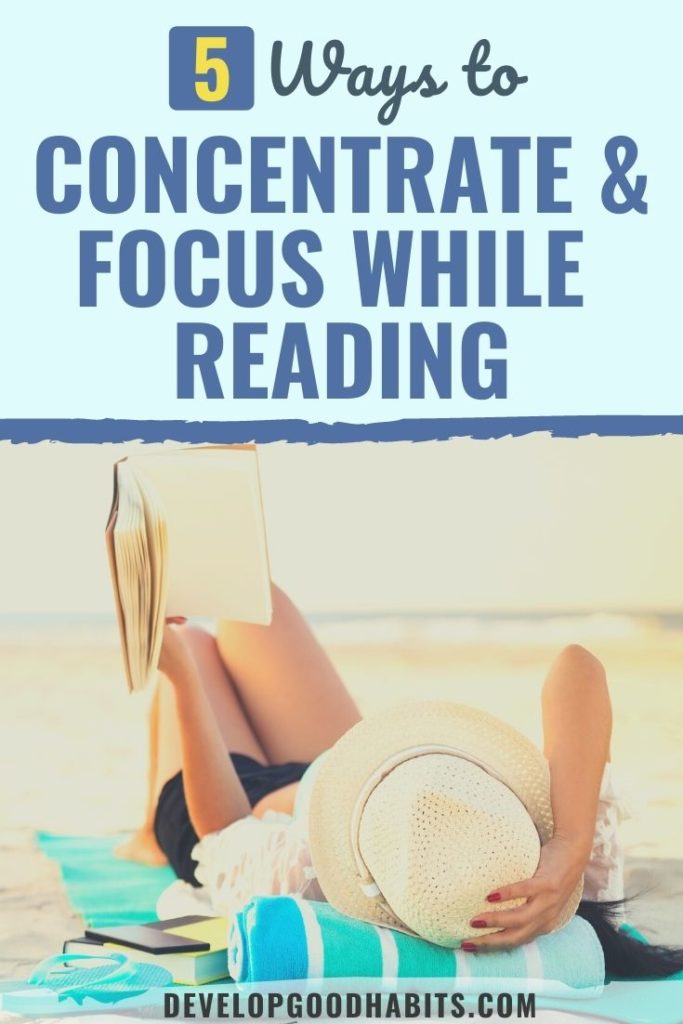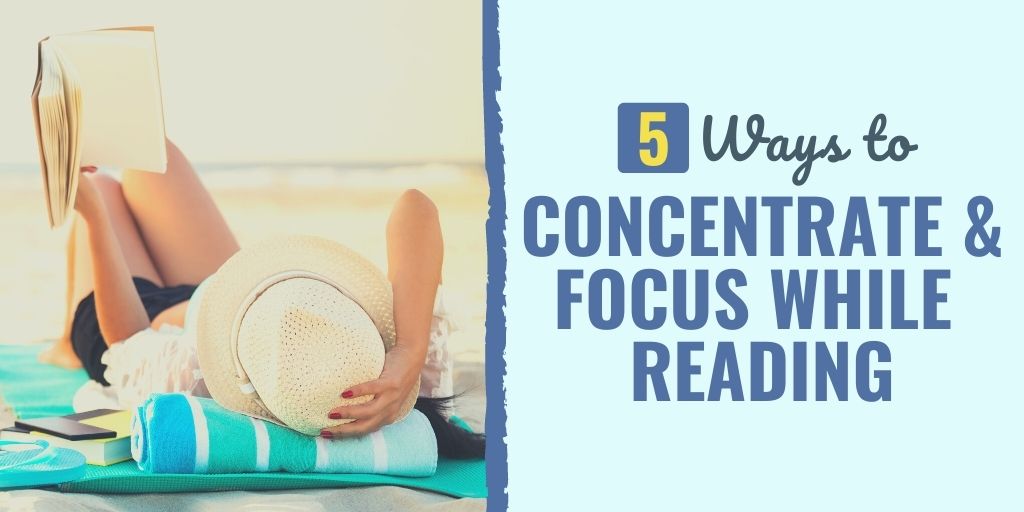There might be affiliate links on this page, which means we get a small commission of anything you buy. As an Amazon Associate we earn from qualifying purchases. Please do your own research before making any online purchase.
Its night, you're relaxed… and you've decided to snuggle up in bed for some reading. For the first few minutes, your eyes digest the words with increasing speed. That is, until you look away distracted, unable to return to your reading with anywhere near as much attentiveness as before.
Turns out, getting distracted while reading is common, which is why we’d all benefit from some tips for concentrating for longer periods of time. In this article, we’ll cover all you need to know about how to concentrate while reading so you can get the most out of the stories you consume.
Why Are so Many People Distracted While Reading?
Where should I begin? Well, there’s
Negative experiences and bad habits can cause you to ruminate and lose focus. Lack of sleep reduces alertness and causes drowsiness. The absence of nutrition affects brain chemistry and attentiveness, all while making further reading extremely challenging. Of course, smartphones and tablets add information to your brain, pulling your eyes from a good book and making concentration impossible.
If you think of the last time you were stressed, you know how your brain sticks to negative information even when you're trying to read. Your mind wanders, your blood pressure's higher, and your temper might be short enough to stop reading at once.
Stress consumes the body's energy, the energy you need to focus, and without relief, you're distracted from a focused read. Think of college students and the stress they endure, even if they're earning strong grades throughout the year. The addition of chronic stress adds to an inability to be mindful, to keep reading, to comprehend by remaining present.
Now, comprehension starts with understanding. But how do you understand what you're reading if your mind is focused on what's wrong? For that matter, how can you comprehend text unless you're getting the minimum hours of sleep at night?
While getting a good night's rest stops grogginess, being too tired to keep your eyes open leads to cognitive impairments. That's poor processing of details, or an inability to retain facts, so just accept, your brain won't work well without sleep.
And not eating? Or eating junk? Your body needs vitamins, nutrients, and antioxidants. From food cravings to the grumbling in your stomach, a poor appetite without nutrition is a problem. To wrap it all up nicely and neatly, poor nutrition is a reason you're distracted.
What Are the Benefits of Reading?
You probably remember the joy of reading a great book when you were a kid and the hours and hours that passed by. As long as you could concentrate, you didn't feel bored and could keep reading for the rest of the day. Book clubs, live readings and many school programs were designed around the art of reading. Reading is enjoyable and therapeutic, and can boost your brainpower for the better.
If you want to learn, then read. If you want to grow, then read. If you want to learn new ideas, appreciate different cultures, and use critical thinking to increase understanding, then read. Reading allows you to immerse yourself in the experiences of others while learning.
Both pleasure reading and educational reading produce clarity where there are uncertainties. Empathy for what others live through. And an improved, more intellectual, refined vocabulary for communicating.
In all, one of the best ways to develop good habits is to read on a regular basis. Reading is important because it helps your memory, boosts your writing skills (always helpful!), and can even help reduce symptoms of depression. Here are some more situations where reading can change your life:
You know how great reading is, but you still can't concentrate! If that's true, don't worry, as focusing while reading is possible.
How to Concentrate and Focus While Reading
Concentration and focus are all about organization and structure. You should have similar thoughts, be in a similar environment, and be ready to digest large amounts of information. With effort. Here's how to concentrate on reading so you can improve cognitive function over time.
1. Create a reading routine
Ready to get reading and feel confident you'll stay focused? A routine is your solution to concentrating on reading for hours. Rather than randomly choosing times for reading, a routine puts you in the mindset to know the task at hand is important. You'll be less likely to drift in and out, but more likely to stay focused for hours.
Routines eliminate distractions and create space for one primary task. Like a morning routine might consist of washing up, eating breakfast, having coffee, and going for a walk, a reading routine might consist of tidying up, taking a shower, changing clothes, and having some tea in your bed. The purpose of a routine is to rely on a conscious, focused, and meaningful set of activities. All of which, when done, will serve your goal of staying focused on reading.
2. Get comfortable reading short materials
If you're struggling to concentrate, reading twenty pages, a long-form blog post, or an exhaustive feature article will take getting used to. Even if you've read frequently your whole life, your brain, despite not being a muscle, will take exercise and training to remain attentive.

The reasoning is logical; consider how hard it is to finish a long text. Initially, you'll read for a while, until your brain gets used to the work. The work is focusing on reading and concentration, both of which require practice.
Catching up on reading should be your goal!
From short articles to blog posts, quick essays, and op-eds. Plan with the idea that you'll stick to 15 to 30 minutes of reading at first, then graduate to an hour and a half, three hours, and finally five hours at a time per session. At the end of each “shift”, you'll be weary, which is why you'll want the satisfaction of finishing a piece.
In essence, the end of each piece of writing gives your brain a reward, making concentration easier over time. You'll just know. You've accomplished something, so from here, keep reading. Read for a little longer, or even longer, and you'll get hours of concentration and focus to enjoy. That's a time where you feel at ease with the material, your mind drawing inferences, conclusions, analysis, and ideas.
3. Meditate before reading
Breathe in, hold it, and breathe out. Repeat. Again and again, for about thirty to forty-five minutes, or as long as you need to get focused and relaxed, and in a state of mind to concentrate on reading. Accept reading as the next activity following meditation and you'll be halfway towards your goal already. Overall, you're trying to eliminate as many unrelated thoughts as possible, then stay attentive to the information you're consuming.
If you think of when you're most focused, you'll know that living in the present is essential to keep your mind focused on what you're reading. Shutting your eyes, getting into a comfortable space, and adding a meditation video or playlist will help with the process. You'll also want to concentrate on something specific. An object, the sound of your breathing, or the smell of soothing fragrance in the room.
Quick tip: You can add meditation to your reading routine! Trust yourself, smile in the mirror, and define your goals to stay present in the moment.
4. Review what you're reading
What better way to stay focused than to look over reading materials before starting? Skim the titles and take note of headers, then browse subheadings to stimulate your mind. Having an active brain peaks interest, so you'll be ready to dive into the material with passion.
On your final look-through, you'll notice bold passages, italicized sources, bits of research, and hard claims. Ideally, you pick up on phrases. Keywords spin in your mind. You settle down to read. You understand. You know what material you're getting into, and most importantly, you know why. Now, you can stay focused on reading.
In a reader's paradise, words travel fast, faster than time even. The last time you sat and enjoyed a great read, did you feel confused and disoriented, wondering why the piece was written, and for what purpose? Such an experience indicates poor concentration but an improvable situation: the longer you can recall vital details from reading, the easier it is to keep consuming more material. So, conduct additional reviews by completing each text and taking notes of the major takeaways from the material. In doing so, you eliminate feelings of being overwhelmed, and you won't have as much information to recall at once.
Of course, consistently rereading and reviewing information is a sign of authentic learning, which takes time. If you want to know how to concentrate while reading, you can go a long way with a lifelong reading habit, so start today to get on the right track.
5. Add white noise or light music
You know, whirring fans, static radios, humming humidifiers, and generators? White noise masks other sounds such as barking dogs and cars on the street. The bottom line, white noise helps you sleep and stay sane while blocking out sounds that distract you from reading. What's more? Switching on a device that generates white noise will help you keep reading for hours longer than usual. From a practical standpoint, a consistent sound lulls the mind into focusing, so much that you might even feel sleepy while still concentrating.
Light music, such as classical or jazz, is shown in studies to have a positive effect on concentration. If you're ready to read with clarity, chances are, you're probably eager to absorb ideas and think critically. If so, a light, pleasant, and slightly relaxed playlist is your solution, so trust you don't have to look further than YouTube for concentration. Interestingly, many of these videos often feature pink noise, ambient nature sounds, thunderstorms, or traffic traveling down a wet highway. Experiment with which is best, white or pink noise, or music, and watch your ability to concentrate improve with effort.
And here's a bonus! Reading helps with concentration, so you're bound to get more done. So, you'll be equipped for productivity in the office, which can only come from eliminating distractions and staying focused.
Final Thoughts on Concentrating While Reading
Learning to concentrate while reading is important. So important, since retaining information, thinking critically, and empathizing with others' experiences are part of being human.
When you learn how to concentrate while reading, you focus on creating an environment that supports long hours of staying up with a good story that captivates. Because reading can change your life, developing the habit of staying focused longer is essential to happier living.
Now that you're finding so much joy in attentive reading, you're willing to think critically about what you're learning. Read 7 Habits to Build Better Critical Thinking Skills to get the most out of your brain while reading.
Finally, if you want to take your goal-setting efforts to the next level, check out this FREE printable worksheet and a step-by-step process that will help you set effective SMART goals.


